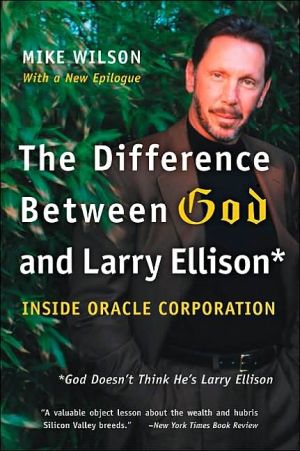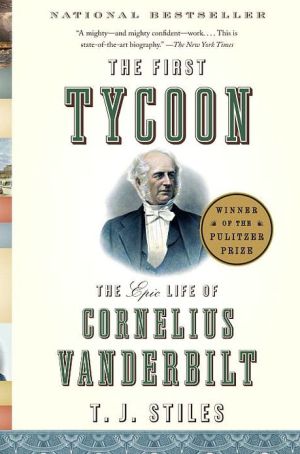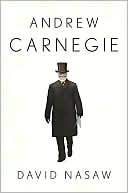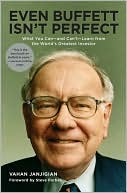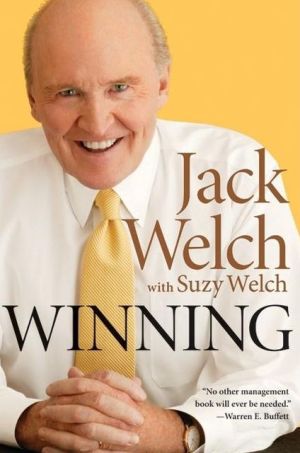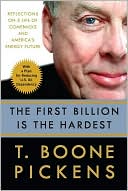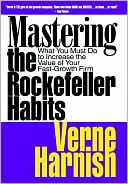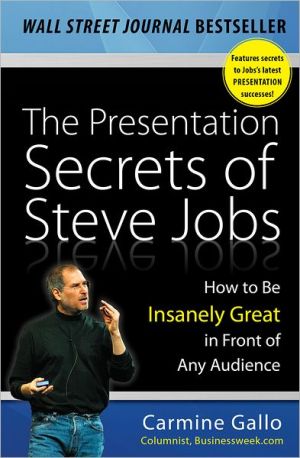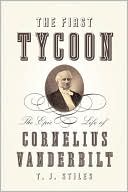Difference between God and Larry Ellison: God Doesn't Think He's Larry Ellison
Larry Ellison started the high-flying tech company Oracle with $1,200 in 1977 and turned it into a billion-dollar Silicon Valley giant. If Bill Gates is the tech world's nerd king, Ellison is its Warren Beatty: racing yachts, buying jets, and romancing beautiful women. His rise to fame and fortune is a tale of entrepreneurial brilliance, ruthless tactics, and a constant stream of half-truths and outright fabrications for which the man and his company are notorious.\ Investigative reporter...
Search in google:
An entertaining and provocative portrait of Bill Gates's chief rival in Silicon Valley -- a $6 billion man with a $30 billion company. Publishers Weekly Silicon Valley seems to hold an endless fascination for business readers, and there are few more intriguing characters than Larry Ellison, founder and CEO of Oracle Corp., the huge software firm, and reputedly the fifth-richest man in the U.S. Be it the homes he is building, the women the thrice-divorced Ellison is dating or the (frequently none too favorable) comments he makes about his competitors, the self-made billionaire generates a lot of press. In this biography, Wilson, a reporter for the St. Petersburg Times, does a solid job of punching holes in the myths that surround Ellison. It turns out that his subject didn't grow up on the streets of Chicago, as he has led some to believe, nor does he have a college degree, let alone the graduate degrees attributed to him. As for the rest of Wilson's take on Ellison, who agreed to be interviewed for the book, the title tells close to all. The author paints a slightly broader picture of his subject, but this "update" of the Citizen Kane legend makes it clear no one is going to accuse Ellison of being self-effacing. Photos not seen by PW. (Nov.)
LARRY ELLISON WALKED DOWN THE LONG HALLWAY, HIS SNEAKERS chirping quietly as he approached the living room. The hallway was narrower at his end than at mine, so Ellison seemed to grow larger as he moved toward me, an optical illusion that would have pleased him. He wore white gym shorts and a white T-shirt, and his youthful face was still glowing red from his afternoon workout. \ I had arrived thirty minutes earlier, at the appointed time. Klaus, a member of Ellison's domestic staff, had ushered me inside, and Maria, the maid, had given me a soft drink.\ Hi, sorry I'm late, Ellison said, extending an outsize hand. Embroidered onto his shirt was the word SAYONARA, the name of his yacht. His mouth was saying hello, but his shirt was saying goodbye. The contradiction seemed appropriate: As the entire world of high technology knew, Larry Ellison was a hard man to pin down.\ We chatted for a moment. Then sayonara he excused himself and disappeared up the spiral stairway to take a shower.\ After he had rotated out of sight, I had a few more minutes to look around. Standing in the vast living room of Ellison's San Francisco home was like being transported into the pages of Architectural Digest. A couple of black lacquer stereo speakers stood like monoliths near the fireplace, a Steinway grand piano stood three-legged in the corner, and on the coffee table a pair of wire-frame glasses lay on top of a stack of art history books. The house had many other impressive features that could not be seen from the living room. A computer in the closet controlled more than five thousand lights, all of which could be dimmed or brightened according to the time of day or Ellison's mood.In the entertainment area an eight-thousand-dollar video projector produced a razor-sharp picture even when the room was not fully darkened. (Someone had told me that NASA used the same kind of projector at Mission Control.) The house also had a courtyard patio made of bronze tiles, a unique handmade snooker table in the game room, and two shiny stainless steel garage doors that looked great except that they showed fingerprints.\ Probably the most remarkable thing about the house was the view -- the best view money can buy -- the designer had told me. I couldn't quarrel. Through the broad living-room windows I could see Alcatraz Island, Sausalito, the Golden Gate Bridge -- the great, misty San Francisco panorama.\ And this was just Ellison's entertainment house, his -- pied-`-terre, -- the home where he gave parties and did business whenever he happened to be in the city. His main residence, a ten-thousand square-foot Japanese-style house with a large garden and an authentic teahouse, was down the peninsula in Atherton. And he was currently building a new Japanese estate on twenty-three acres in Woodside, a wooded village in the Silicon Valley hills. The projected cost: forty million dollars.\ He could afford it. Only days before this interview, my first with Ellison, Forbes magazine had estimated his net worth at six billion dollars. According to the magazine, that made Ellison the fifth-richest person in the United States. Some of the people on the Forbes 400 didn't like having their fortunes discussed publicly; as I was about to see, Ellison was not one of them. He enjoyed the attention.\ Soon he reappeared, wet-headed from the shower and dressed casually in slacks and a black, short-sleeve polo shirt. He led me to a table in the far corner of the room and offered me a seat. The table had place settings for two. After a moment the staff arrived with plates of fresh greens, the first course of what turned out to be a three-course lunch. Ellison, a man of legendary appetites, drank about a quart of carrot juice with his meal.\ I began by asking him to talk about his childhood in Chicago. He did, briefly. Then seamlessly and effortlessly he segued into a speech about Bill Clinton's failed attempt several years earlier to remake the American health care system. Ellison believed that the President should have left health care alone and focused on education.\ I have added punctuation to make the following paragraph readable, but when Larry Ellison was speaking, there were no commas or hyphens. He talked so fast that he mutilated some sentences and even some words. For example, when he said the word -- graduating, -- it sounded like gradjing. He ate - uate.\ People get on airplanes all over the world and fly to the United States to get health care. And we have an educational system that would be an embarrassment to a third world country, he said, overstating the case, as he often did. No one flies here to send their kids to the seventh- and eighth-grade public schools in San Francisco or New York City or Chicago. I just think Bill Clinton was wrong.... First of all, health care is not a government monopoly. Education is. So government taking responsibility for fixing this problem is absolutely appropriate. (Government taking responsibility for fixing health care, which isn't broken.) People get on airplanes and fly here. Don't get me wrong. I think that there are access problems with our health care system. The very poor can't get at it. Interestingly enough, one of the big groups who don't get to have health care are people just graduating -- gradjing -- from college.... So a lot of these statistics can be very misleading. Some of the people who don't have access really are not at risk. There are others -- the very poor -- who really are at risk, and they don't have access, so we have to do something about that. But I don't think you revamp the entire health care system, which delivers incredible quality health care, the best health care in the world, you don't revamp that system of private-public cooperation that exists right now and turn it into a public monopoly.\ Around the time of my interview with Ellison the business pages were full of articles about search engines, computer programs designed to help people find information on the World Wide Web. That was the way Ellison's mind worked. He was like a search engine gone haywire. If you asked him for information about Chicago in the 1950s, he told you about the Clinton presidency.\ I tried again. I asked Ellison how he had seen his adult life when he was a kid. What had he thought was going to happen to him?\ You mean, did I anticipate being the fifth-wealthiest person in the United States in 1996? No, he said. I mean, this is all kind of surreal. I don't even believe it now. Not only did I not believe it when I was fourteen, but when I look around, I say, this must be something out of a dream. Coming from almost anyone else, the phrase -- something out of a dream -- would have sounded hackneyed, but Ellison, an utterly self-made man, meant it. A dozen years after he accumulated his first million, his good fortune still amazed him.\ Then the conversation shifted again, and Ellison began to talk about some of the bizarre and farfetched stories that had been published about him. For example, the Wall Street Journal once said that he used to sign his checks in green because green was the color of money. Ridiculous, he said: My favorite color happens to be green, but not because it's the color of money. He also mentioned a 1991 article in a technology industry magazine called Upside that talked about the way Ellison had bought this very house. As Ellison remembered the article, it said he and his then girlfriend drove past the house at 2:00 A.M. and liked it. Ellison woke up the owner, bought the house for four million dollars in cash (he had the money in the trunk), then took his girlfriend inside and had sex with her.\ Five years after the article appeared, Ellison was still astonished that such an outlandish story had been published. Four million dollars for sex? he said. I mean, excuse me? He said he bought the house from the estate of the owners, who were dead at the time.\ Later I looked up the Upside magazine article. The actual anecdote wasn't half as juicy as the one Ellison had told me. It said Ellison and his girlfriend were driving home from the symphony when they saw the house. [He] rang the doorbell and offered to write a check on the spot. The owner, in his bathrobe, was shocked and initially refused, but over the ensuing months Ellison managed to buy the house anyway. Upside attributed the story to anonymous sources, who said they'd heard it from Ellison. There was no mention in the article of wads of cash and not a whisper of celebratory sex.\ This was classic Larry Ellison: He had embellished the story even while denying it. If he was going to be the subject of a rumor, then by God, he wanted it to be an interesting one. The Difference Between God and Larry Ellison. Copyright © by Mike Wilson. Reprinted by permission of HarperCollins Publishers, Inc. All rights reserved. Available now wherever books are sold.
\ Publishers Weekly - Publisher's Weekly\ Silicon Valley seems to hold an endless fascination for business readers, and there are few more intriguing characters than Larry Ellison, founder and CEO of Oracle Corp., the huge software firm, and reputedly the fifth-richest man in the U.S. Be it the homes he is building, the women the thrice-divorced Ellison is dating or the (frequently none too favorable) comments he makes about his competitors, the self-made billionaire generates a lot of press. In this biography, Wilson, a reporter for the St. Petersburg Times, does a solid job of punching holes in the myths that surround Ellison. It turns out that his subject didn't grow up on the streets of Chicago, as he has led some to believe, nor does he have a college degree, let alone the graduate degrees attributed to him. As for the rest of Wilson's take on Ellison, who agreed to be interviewed for the book, the title tells close to all. The author paints a slightly broader picture of his subject, but this "update" of the Citizen Kane legend makes it clear no one is going to accuse Ellison of being self-effacing. Photos not seen by PW. (Nov.)\ \ \ \ \ BooknewsDraws on interviews with Ellison's friends and enemies, as well as Ellison himself, to create a portrait of the self-made billionaire who founded Oracle, the second largest software company in the world, with a $1,200 investment. Details growth of the company and financial mismanagement that came close to driving the company into bankruptcy, and tells of Ellison's exploits in sports and romance. Annotation c. by Book News, Inc., Portland, Or.\ \ \ Kirkus ReviewsAn authorized biography of Oracle's founder and brash billionaire leader.\ Ellison, the adopted son of a Jewish couple from Chicago, seems to specialize in reinventing himself. By all accounts, he grew up on middle-class South Shore Drive, but he has told reporters that he lived in the South Side ghetto. He was an uninspired student who never received a college degree but would maintain something of an obsession with the University of Chicago and imply he had an advanced degree in physics. Ellison is also an indifferent student of language but has arranged his home with all the trappings of a Japanese lord, and a few boats and helicopters to boot. These grand inconsistencies—delightful to some, horribly irritating to others, including many former employees—go a long way to explaining Ellison's unbelievable success at marketing his Oracle database software, used by thousands of companies. One employee, a devout Mormon named Rick Bennett, even considered his ubiquitous software akin to "an instrument of God" and believed Ellison pivotal to modern-day Mormonism. Wilson, an investigative reporter for the St. Petersburg Times, wisely focuses much of the attention on Ellison's one-sided feud with Bill Gates (who views Ellison as something of a gadfly but doesn't mention his name at all in his book, The Road Ahead) and documents his obsession nicely. He also does a fair job of explaining Ellison's vision for the NC, an inexpensive computer that provides quick access to the Internet and stores all of its software on a network server, rather than on a hard drive. While some in the computer business see the NC as the future computer for schools, many others see it as a $500 empty box and a poor attempt to topple Microsoft.\ While the title is the funniest line of the book, this is an engaging, humanizing look at a Silicon Valley megalomaniac.\ \ \
